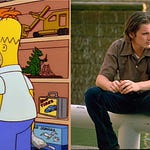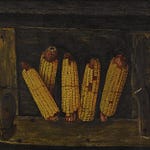On the first night of my first year of college, I opened my graduation gift PowerBook, plugged in my school-provided ethernet cable, and launched iTunes.
This was the Rip. Mix. Burn. era of digital music. iTunes was the center of my world. I spent hours in the app listening to songs and updating the tags on MP3s so my music could be as cleanly organized as possible. I made playlists that lumped tracks together by producer, by session musicians, by samples used. I knew every note in my library and every pixel of the program. But that night on campus, I saw something I had never seen. In the sidebar, underneath the Music Store icon and above my playlists, was a dropdown menu and the heading “Ashley Smith’s Music.”1
It was my first time connecting to a local network. And it was my introduction to a feature in iTunes that let you listen to music from other computers on your local network, as long as the user was online and had the app open. Ashley was into pop punk and, I assumed, Napster, based on the format of file names. I clicked on something like "blink182_live-damnit.mp3" and, with almost no delay, it began playing.
As the campus filled up, so did the sidebar of iTunes. We renamed our libraries with the frequency and self-seriousness we’d previously put into AIM away messages. On a whim one Saturday, I made my library name an invitation: “Gabe in 118. Stop by.” Within an hour, a fellow freshman dropped in to say hi. Others did the same, sometimes with blank CDRs or USB hard drives. Several enduring friendships began with chit-chat while waiting for files to transfer.2
This was a small liberal arts college in the Midwest at the peak of the file sharing era, and the taste on display was beyond anything I’d been exposed to before. There was jazz from the music students, showtunes from the theater program, orchestral scores from the film studies majors, and the international students had songs that weren’t covered on the American music blogs I read at the time.
The iTunes shared library scene on campus was a big part of my social life. Knowing each other's name and music taste was enough groundwork to start friendships. We went from private listening alone to burning CDs together to organizing carpools to concerts and camping out at the record store at midnight for new releases.3
iTunes expanded my social world, but over time, it shrank my musical world. In my room alone, presented with what seemed like unlimited options for listening, I often chose silence.
For most of my life up to that point, I had been a voracious fan and appreciator of music. I listened to everything I could. When I liked something, I studied it—I looked up the artist online, listened to the sample at the Borders4 CD kiosk, and weighed whether to make a purchase. This was a deliberate and slow process, limited by income and the schedules of people I knew who could drive me to the store. After each purchase, I studied the liner notes, ripped the music to iTunes, burned a copy to keep in my leatherette CD wallet, and filed the original on the shelf. College broke this process. I had days and days of music available to me at no charge. Whenever I put on a new song, I wondered if there was something better or more important I needed to listen to first. Should I listen to Spiderland if I hadn't heard Tweez? Was this the best starting point for Merzbow?
Psychologists might call this Analysis Paralysis, the feeling of being overwhelmed by options. Now I see it as a dangerous point in the life of a fan—the moment when knowing overtakes enjoyment. Listening to music becomes less important than having listened to music. This doesn't just affect people who want a deep understanding of music history. To participate in popular culture, you have to have some familiarity with whatever is popular. This is how the music business works, to a degree—popularity drives popularity, obsession drives obsession. But this system was designed for a narrower time. With everything available at very little cost, the completist sees a way to finish their impossible mission. With instant access to what everyone else is listening to, the zeitgeist chaser has more to catch up to.
Listening to music can be one of the most enjoyable experiences we ever have as human beings. Having access to all music invites us to turn this experience into an assignment. Pleasure loses to compulsion. Or maybe we just confuse the two.
This problem has only grown worse. An app called Music replaced iTunes. The first window it opens isn't my library of music I've acquired. Instead, I see the internet's catalog of nearly every recording. I use Apple Music, but Spotify is the same way. And there are social features, analytics, and year-end recaps of your activity. It's like being on a campus with every record collector in history not only connected to your network, but looking over your shoulder and taking notes.
There will always be more songs than one person could ever listen to. We only let a fraction of recorded music into our lives. The value of our tiny sliver of the global catalog is in the connection we form with it. This connection takes time and attention, which are both hard to give when we're constantly reminded that there's more out there to enjoy. I listen to a lot of streaming music. The experience is like sending an email from a crowded inbox; there's always something else to get around to, and I never end up putting as much thought as I should into the message that's in front of me. After a while, everything starts to feel the same. Everything is instantly forgotten.
This isn't just happening with music. Over the last decade, the term "snackable" has become trendy across media. The idea is that the audience on digital platforms is in a constant state of grazing, so anything they might come across—streaming shows, images, videos, stories—needs to be as easy to consume as it is to access—short, bite-sized, unchallenging, free. But snacks don't sate, so there always needs to be another bite ready. Nutrition loses to quantity. Or maybe we just confuse the two.5
I moved home for the summer after my first year of college. Even though my use of the program had waned, I still opened iTunes every day out of habit. It was enjoyable without the shared libraries. It felt like it was mine again. At the bottom of the main application window, there was a line of text that said how many songs were in my library, how much memory they took up, and how long it would take to play them all. I had quite a collection. It would take weeks to play through. But, for the first time in months, that seemed not only possible, but fun.
Ashley Smith is a pseudonym. I don't remember the real name.
Around this time, those of us on Macs realized that iChat—the precursor to today's iMessage, but then mostly an AIM client—had a feature called Rendezvous that let you message others on the network without needing a screen name. My first message to a stranger was a compliment about their music library.
This was a regular event that's been lost to time. New albums used to come out on Tuesdays, and stores stayed open until midnight so fans could get the CD as soon as possible. For some releases, midnight buyers got stickers, posters, or (best of all) an extra CD of bonus tracks.
This was a store that sold books, music, and coffee.
I feel this pressure all the time. It might be because I'm a child of the internet or it might be because I've spent 15 years in media. But as I type this footnote, I'm anxiously watching the word count on the draft, wondering if I'm going on too long, and wondering if I'm going to have enough time to write next week's newsletter.













